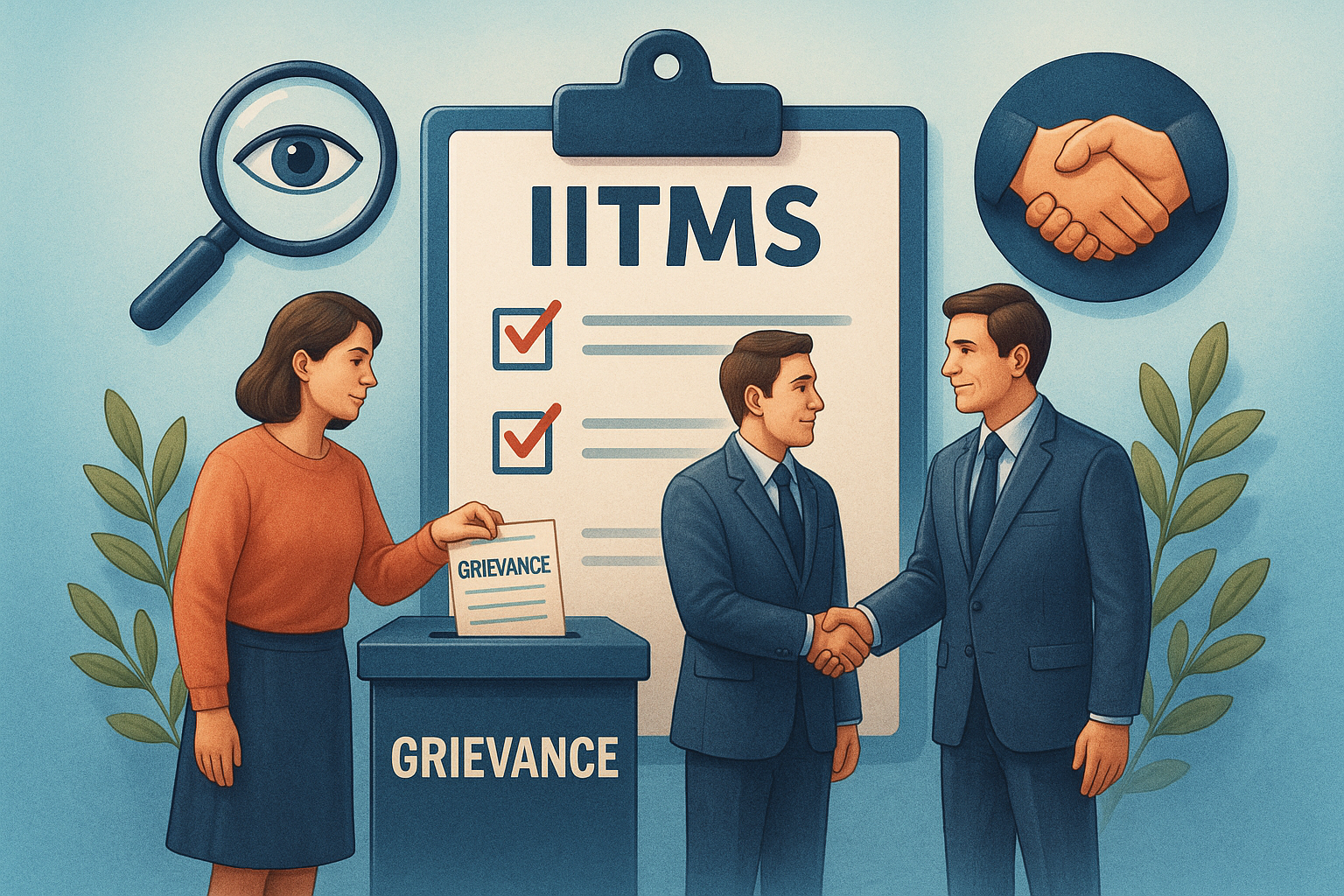Grievance Management System of IITMS: Building Trust with Transparency and Accountability

With growing cities and growing complexity of transport networks, there has never been a greater demand for effective communication among commuters, authorities, and transport operators. Not just safe and efficient travel, but openness, responsibility, and a platform to ventilate their grievances. It is here that the Integrated Intelligent Transport Management System (IITMS) Grievance Management System (GMS) enters the scenario.
By enabling a formal, technology-based platform for handling complaints and feedback, GMS remodels the image of transport networks from stiff and unbending to flexible and human-oriented.
Understanding Grievance Management in IITMS
The Grievance Management System is only an online system integrated into IITMS through which commuters, drivers, and all other stakeholders have the ability to lodge grievances to transport authorities or fleet operators directly. All such grievances range from safety concerns, delays, and service quality to drivers' indiscipline, technical breakdowns, or infrastructure vulnerabilities such as inefficient signals and poor roads.
This is in contrast to the conventional complaint mechanisms, which are normally lengthy manual records or fragmented channels of travel. GMS in IITMS brings all complaints to one location. This convergence makes easy tracking, monitoring, and resolution of issues by officials openly at all levels of the process.
Why Grievance Management is Important in Transportation?
Mass transport systems, school bus operations, and logistics fleets serve millions of individuals every day. Even the best systems are plagued with issues - either congestion-induced delays, mechanical failure, or service shortages. Lack of a formal grievance redressal mechanism may lead to open-ended issues and disillusionment, distrust, and customer loss or driver turnover.
On the other hand, a good GMS in IITMS assures:
Rapid Response: Regular posting of updates to passengers on their grievances.
Transparency: Every grievance is put up online, and there is less room for neglect.
Accountability: Drivers, operators, and authorities are held responsible for service.
Improvement Continuously: Grievance figures provide lessons that allow for space for operations to improve.
Main Features of GMS in IITMS
A grievance mechanism in IITMS does not just involve registering grievances, but creating a channel for feedback that helps in making the overall transport service more efficient. Some of its key features are:
1. Multi-Channel Complaint Registration
Customers can file complaints through mobile apps, SMS, websites, bus stop booths, or even call centres. This puts the entire population of commutants, technologically adept or not, at the centre of exploiting the system.
2. Real-Time Complaint Monitoring
And in keeping with tracking a delivery package, commuters can track how their complaint was processed, from registration to resolution. It provides transparency, trust, and involves users.
3. Categorisation and Prioritisation
Complaints are not created equal. A lost item complaint can be addressed independently of a crisis case because of driver negligence. Intelligent categorisation by GMS is used to classify the cases according to priority and urgency.
4. Integration with ITMS Modules
Since the system is to be integrated into IITMS, it is able to link complaints against modules such as vehicle tracking, video tracking, or GPS tracking. For instance, if a commuter complains of reckless driving, the system can cross-match driver behaviour history and video.
5. Automated Notice and Alerts
Automated alerts are given to both the complainant and officials concerned so that there is no communication gap.
6. Analytics and Reporting
In the long run, GMS accumulates valuable information that can be used by transport agencies to identify chronic problems, inefficient routes, or untrained drivers, which can be remedied through focused interventions.
Advantages of GMS in IITMS
There are a number of advantages to having a grievance management system in the transport management sector. To the visitors, it empowers them and makes them powerful in the sense that they are being listened to and their words are being heeded. To the transport operators, it gives them constructive criticism on areas they need to do better. To the authorities, it lends seriousness and gravity to public transparency and accountability.
In institutional and school transport, grievance processes also yield relief to parents, who can simply report and follow up on the safety concerns of their children. In logistics, grievance processes allow customers to report delays, damage to goods, or delays in service and ensure that action is taken against redressal without delay.
The Future of Transportation Grievance Management
With the advent of artificial intelligence, the prospects for GMS in IITMS have never seemed brighter. Chatbots with artificial intelligence capabilities can take care of first-level complaint conversations, sorting and directing the complaints in real time. Predictive analytics would identify trouble hotspots ahead of their happening as mass grievances, allowing regulators to act pre-emptively.
Social networking sites can also be integrated for access, with passengers being in a position to file complaints on sites where they already make a daily contribution. Multilingual support will also grant access to multilingual spaces.
Primarily of all, though, IITMS grievance redressal is ultimately about the development of responsiveness, responsibility, and a sustainable improvement culture, specific to smart cities and sustainable mobility goals.
Conclusion
Arena Softwares IITMS Grievance Management System doubles the duty and confidence by unfolding an open, responsive window for the resolution of commuter complaints. As newer, more complex transport networks get ready to make their entry, Arena Softwares GMS is lean and effective. Yet, the true future of mobility lies in focusing on people—proving that smart transport is as much about humans as it is about technology. Get in touch with Arena Softwares for more information about the grievance management system. Contact Arena Softwares today.
